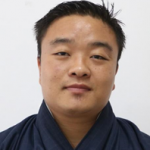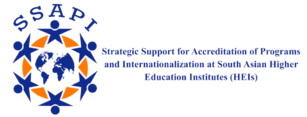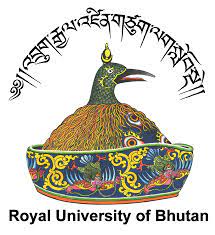
The Royal University of Bhutan is one of three Universities in the Kingdom of Bhutan with its nine constituent colleges whose campuses are located in different parts of the country. It was the first university established in 2003 to provide tertiary education in the country with the vision to become an internationally recognized university steeped in Gross National Happiness values. RUB has specific objectives to develop and provide programmes of study at tertiary education level, of relevance and good quality which will fulfill the needs of the country for an educated and skilled population, and to promote and conduct research, to contribute to the creation of knowledge in an international context and to promote the transfer of knowledge of relevance to Bhutan. The Royal University of Bhutan (RUB) is the oldest and largest University in Bhutan and currently has about 10297 students and 1227 employees. The University is set up on a federated system with nine constituent Colleges and two affiliate colleges spread around the country while its head office, the Office of Vice-Chancellor (OVC) with three Departments and Registrar’s Office is located in Thimphu, Bhutan. The OVC performs the task of overall coordination and administration of the University’s policy and strategic development. Each College will focus on offering programmes in specific disciplines and the College of Science and Technology located in southern Bhutan is one of the constituent colleges offering undergraduate and master degree programmes in engineering.
Project Goals
The rapid socio-economic development and standardization of the universities and their programs have become important in the tertiary education sector to standardize the quality of the programs offered and the infrastructure available. College of Science and Technology, Royal University of Bhutan has set out following.
- Training of staff on standardization, internationalization, accreditation, and quality assurance or training of trainers (ToT) for accreditation
- Opportunity to listen to the experience of quality education systems in European universities and within the region.
- Observe how self-assessment reports are developed and how the universities prepare for audits.
- Observe how universities prepare for international accreditation.
- Training of nominated RUB staff or training of trainers (TOT) on preparing self-assessment reports for a quality audit.
- Observe how education quality audit is conducted in universities outside Bhutan and how the universities respond to the auditors’ comments and recommendations.
- Learn how developed universities apply for external/international accreditation.
- Receive guidance to apply for international accreditation of sample RUB programmes.
- Experience sharing and training on how the policies and procedures are developed by the departments and faculty, for the education system to pursue international accreditation.
- Visit other universities to learn about their quality education policies and procedures.
- Meeting of standardization, internationalization and accreditation teams of the consortium universities.
University Website - Project Link
Project Members

Dr. Cheki Dorji,
President, College of Science
and Technology, Royal
University of Bhutan
Project Manager and
Accreditation Team Member

Tsheten Dorji
Lecturer, Information
Technology Department,
College of Science and
Technology, Royal
University of Bhutan
Accreditation documentation
for BE in Information
Technology program

Namgay Tenzin
Associate Lecturer,
Electrical Engineering
Department, Centre
Coordinator, Centre for
Renewable and Sustainable
Energy Development,
CST,RUB.
Accreditation
documentation for BE in
Electrical Engineering
program

